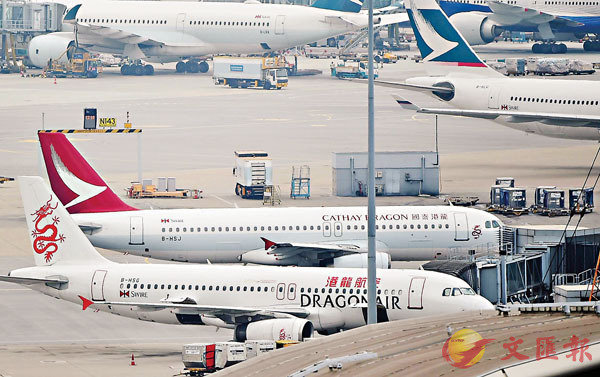 ■國泰早前宣布停運國泰港龍航空及削減約8,500個職位。 資料圖片
■國泰早前宣布停運國泰港龍航空及削減約8,500個職位。 資料圖片【原文】國泰宣布大規模重組計劃,即時停運國泰港龍航空及削減約8,500個職位,當中約5,300名駐港員工,是本港歷來最大規模的裁員行動。國泰指擬尋求監管機構批准,由國泰及旗下全資附屬公司香港快運航空營運國泰港龍的大部分航線。國泰港龍營運的內地及亞洲短途航線,本屬有希望在新冠疫情後率先復甦的航線,卻被率先停運,令業內專家感覺費解。航權屬香港重要的公共資源,國泰港龍停運後,相關航權須由特區政府循既定機制處理,並應以保持競爭、鞏固本港國際航空樞紐的地位為依歸。
國泰是本港最大的航空公司,港龍在2006年被國泰收購後,2016年改名為國泰港龍航空,主要經營內地和亞洲區內短途航線。國泰去年全資收購香港快運後,國泰港龍和香港快運的業務幾乎重疊。國泰的內地航點只有北京、上海、成都及廈門4個,而國泰港龍航線則涵蓋內地20多個城市,並已建立良好口碑。
由於疫情率先受控,中國內地已成為全球人員流動、經濟活動恢復最快的主要經濟體,國慶期間超過6億人次的旅遊出行令世人驚艷。只要本港疫情進一步受控,恢復與內地交往,香港將成為中國經濟「內循環」的組成部分,國泰港龍的內地航線很大機會是國泰系內率先復飛的航線,為國泰創造收益,有助整個國泰系紓緩壓力。但國泰選擇結束國泰港龍,令業內人士頗為詫異和不解。國泰向港龍開刀後,將尋求特區政府批准,將港龍航線轉交國泰及香港快運營運。有業內專家分析,國泰的算盤可能是進一步加強對香港市場的壟斷,令國泰既可縮減架構,又保住所有航線。
航權是指由兩個地方簽訂的航空協議,涵蓋航班數目、航點、飛行空域等。航空公司必須有航權,才可營辦指定航點的相關航線。本港航權由中央授權特區政府與其他國家及地區談判航空運輸安排,由特區政府負責公開予本地航空公司申請。所有在香港註冊的航空公司所使用的航權,實際上屬特區政府所有,是香港作為國際航空樞紐的重要公共資源,並非任何航空公司的私產。
在國泰重組的消息公布後,運房局已明確表示,國泰港龍必須將航權交還特區政府,不能將有關航權轉讓予其他公司,各本地航空公司可以申請使用有關航權,並由運房局按既定機制分配。運房局強調,航權分配的首要原則,是公共資源能夠被充分地利用,以鞏固、增強香港航空業的競爭力。業內和社會人士均指出,任何行業均應保持競爭, 有競爭才會令原有營運者不故步自封,消費者才能從中獲益,新競爭者亦可提供更多優質服務和就業機會,有利行業健康發展。因此,特區政府在考慮國泰重組帶來的航權使用問題時,應考慮保持必要的競爭,促進本港航空業良性發展。( 摘錄自香港《文匯報》社評2020-10-22)
Properly handle Cathay Dragon traffic rights to maintain market competition
【譯文】In accordance with the large-scale reorganisation plan announced by Cathay Pacific, Cathay Dragon was grounded immediately while approximately 8,500 positions were cut. Some 5,300 Hong Kong employees lost their jobs in what is the largest layoff in the history of Hong Kong. The company is now seeking approval from regulators for Cathay Pacific and its wholly-owned subsidiary Hong Kong Express to operate most of Cathay Dragon's routes.
Cathay Pacific's decision to abruptly shut down its subsidiary has left experts in the field puzzled, as Cathay Dragon's short-haul routes from Hong Kong to mainland China and other parts of Asia were among those that could resume the soonest, once the Covid-19 pandemic comes under control. As traffic rights are important public resources of Hong Kong, the rights that were originally held by Cathay Dragon must be handled by the Hong Kong government in accordance with established mechanisms. Subsequent re-allocation of the traffic rights should also take into account two principles, which are the maintenance of market competition and the consolidation of Hong Kong's status as an international aviation hub.
Cathay Pacific, the largest commercial flight operator in Hong Kong, acquired Dragonair in 2006 and later rebranded it as Cathay Dragon in 2016. Ever since its acquisition, Cathay Dragon has maintained its good reputation and mainly operated short-haul routes between Hong Kong, mainland China and other parts of Asia. It covers more than 20 Chinese cities while its parent company only covers the four destinations of Beijing, Shanghai, Chengdu and Xiamen.
However, its operations seriously overlapped with Cathay Pacific's newly acquired Hong Kong Express last year.
Being the first country to bring the Covid-19 pandemic under control, China has become the quickest in the world to recover both in terms of economic activities and traffic, with over 600 million trips being recorded on its National Day. Once the pandemic in Hong Kong is brought under control and traffic with the mainland is resumed, Hong Kong is set to be integrated into China's economic "internal cycle".
Cathay Dragon's routes to mainland China could have taken pressure off its parent company, as those are very likely to be the first of the groups' many routes to get back into schedule, creating revenue for Cathay Pacific. However, Cathay Pacific ultimately decided to shut down Cathay Dragon, leaving the rest of the aviation industry surprised and puzzled. The aviation giant will allegedly seek approval from the Hong Kong government to absorb Cathay Dragon's routes together with its other subsidiary Hong Kong Express.
According to industry experts, Cathay Pacific might be looking to consolidate its monopoly on the Hong Kong market, so that it could simplify its corporate structure while maintaining all its routes.
Traffic rights are aviation agreements signed between countries that cover the number of flights, destinations, and airspace. Airlines must be granted traffic rights before they can operate a route between the specified destinations.
The SAR government negotiates aviation agreements directly with other countries and regions under the authority of the central government of China. Applications of traffic rights are also managed by the Hong Kong government.
The traffic rights granted to airlines that are registered in Hong Kong are therefore important public resources that belong to the SAR government instead of private properties of airlines.
Following the announcement of Cathay Pacific's reorganisation, the Transport and Housing Bureau has clearly stated that Cathay Dragon's traffic rights must be returned to the government and cannot be transferred to other companies.
Other Hong Kong-based commercial airlines can apply for the use of the said traffic rights, and the Transport and Housing Bureau shall re-distribute the rights according to the established mechanism.
The Transport and Housing Bureau emphasised that the major principle of air rights allocation is that public resources can be fully utilised to consolidate and enhance the competitiveness of Hong Kong's aviation industry. Both the aviation industry and the society have pointed out that competition is crucial to progress and consumer welfare.
New competitors can also bring more quality services and employment opportunities, which is beneficial to the healthy development of an industry.
Therefore, the government should bear in mind the maintenance of competition in the aviation industry when handling the traffic rights issue that is brought about by Cathay Pacific's restructuring.■Jeffrey Tse
Exercise
1.航點
2.子公司
3. 壟斷
4.合併
5. 收購
Answer
1.destination
2.subsidiary
3.monopoly
4.merger
5.acquisition

